Reviews & Articles
疫情決策中的政治 | Politics amidst Covid-19 decision-making
John BATTEN
at 10:51am on 19th August 2020
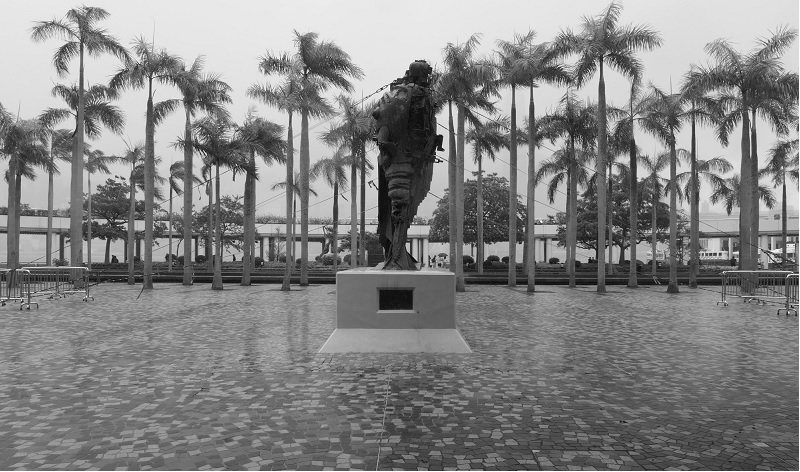
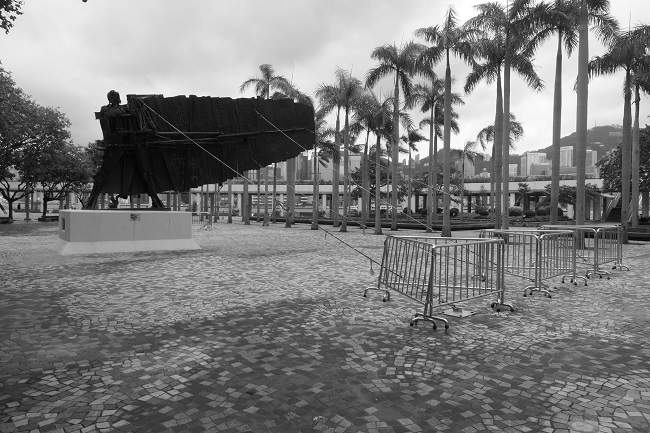
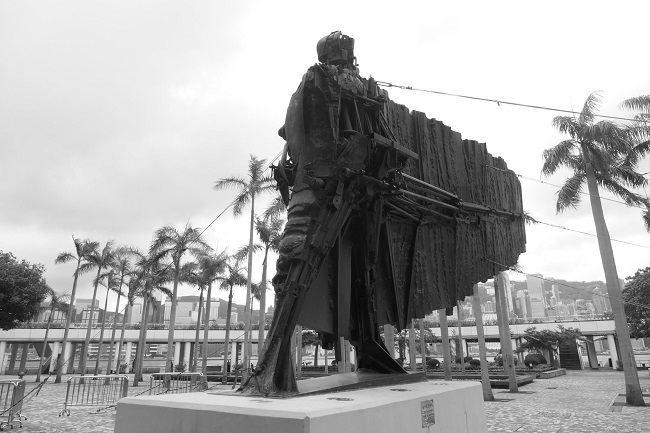
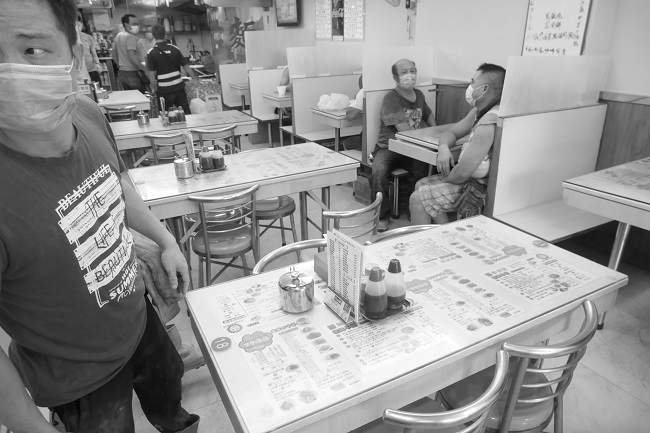
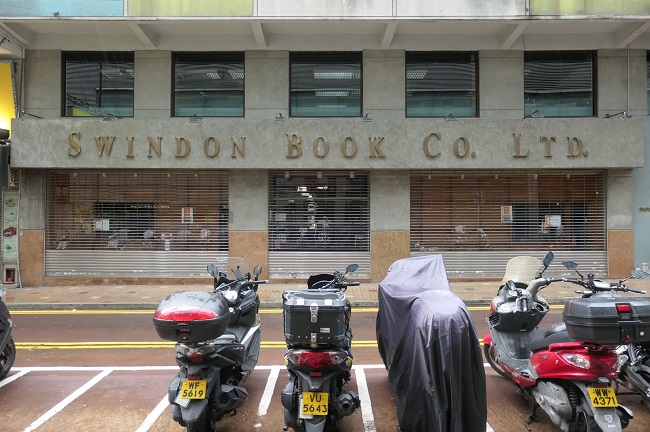
圖片說明:
1.-3.香港,尖沙咀,法國雕塑家塞薩爾的《飛翔的法國人》被網索綁住加固。
4.(「美好生命/炎夏」)香港,北角,在新冠病毒疫情下的禁堂食令,人們在等候拿外賣。照片中的建築工人通常都會在這間茶餐廳吃午飯,但卻因為政府前一天頒佈的禁堂食令而無法這樣做。他們只能叫外賣到店外進食。政府的全日禁堂食翌日便告取消。
5. 2020年8月1日,尖沙咀,現已關門的辰衝圖書。
所有照片由作者提供
Captions:
1.-3. The Flying Frenchman by César, Tsim Sha Tsui, Kowloon, Hong Kong, 1 August 2020. Restrained by ropes.
4. (''The Life Beautiful/Hot Summer'') Waiting for takeaway food during Covid-19 dining restrictions, North Point, Hong Kong, 30 July 2020. This photo shows construction workers, who would normally be eating lunch in this cha chan teng, but cannot due to restrictions imposed by the government the previous day. They can only order and take away their food - to be eaten outside. The government’s dining-in restriction was reversed the next day.
5. The now-closed Swindon bookshop, Tsim Sha Tsui, 1 August 2020.
All photos: John Batten
(Please scroll down for English version)
我猜行政長官林鄭月娥一定是計好時間,才在2020年7月31日的星期五晚宣佈本年立法會選舉延期一年,這樣便可以避開平日熱熱鬧鬧的各大電台觀眾來電節目、工作間討論和城中大大小小角落「打邊爐」時的聚集閒聊。她在宣佈中強調這次「七個月來最困難的」決定,純粹是基於新冠病毒疫情下的健康和安全考量而作出。然而,她也提及現時不少香港市民居於中國內地,他們會因為檢疫規定而無法及時回港投票,這也不夠公平。這說法馬上被挑戰,因為香港的投票從來都只是為了那些身處香港的「普通市民」而設。林鄭否認這項決定有任何政治考慮。然而,香港政治領䄂每一個決定都是政治性的。這是特首的角色的基本。但是,她常認為政治會沾污她的工作;事實上,她如何運用政治才是工作重點。此外,作出這樣一個重大(而不涉及政治!)的決定,我城卻被迫墜入了政治和憲制危機,將會令來年立法局任何問題都蒙上陰影。
市民不會容易被騙:這不過是中央政府在發施號令,林鄭只是按他們的節奏辦事。香港政府將會溫順遵從所有中央當局頒佈的「澄清」來解決多種憲制問題。《基本法》清楚列明任何延後選舉的安排,但卻沒有任何內容涵蓋突然取消9月選舉的情況。投票權是香港的核心價值之一,也寫進了《基本法》。事情非常簡單:香港的 「兩制」在「一國」中是獨一無二的,因為一般人可以透過投票直接選出我們立法會的代表。在內地,他們不能。
翌日,香港受海南島對開幾乎形成颱風的外圍影響,下起狂風暴雨。我當天到了尖沙咀,去為現已關門的辰衝圖書拍照,並去買一瓶酒,用來在晚上的卡牌遊戲(凱納斯特紙牌,不是較執著的樸克!)助興。我走到天星碼頭,被強風和大雨吹得左搖右擺。在海傍樹立的雕塑,塞薩爾的《飛翔的法國人》,因為強風訊號生效而以網索綁緊加固。作品原稱「自由戰士」,但名字於1992年被香港有關當局拒用。以這畫來比喻香港前一天取消立法會選舉的消消,實在太貼切不過:我建議應永久保留以鋼索綁緊雕塑,以此為鑑;到了市民再有自由參與公平選舉才把這些束縛拆除吧。
在公佈選舉決定前的數星期,政府開始展開一種論述,表示香港的新冠病毒疫情已失控。政府在一系列決定中逐步收緊對商業經營和人群聚集的限制(從8人至4人,現在已收緊至兩人)。其中,全面禁止堂食的措施便完全適得其反。全民被迫只准外賣不得堂食,工人們沒有地方吃午飯。禁堂食令實施的首天,遇上了熱帶地區常見的大雨,網上瘋傳了一張又一張全身被雨濕透的工人在戶外和路邊吃飯盒的照片。政府在兩天後便急急把限制收回,可說是政府官員離地的又一例子。正如任何人都知道,很多香港人的蝸居根本沒有足夠設備或空間來準備食物和用餐。
然後,在星期五宣佈取消選舉後,政府採取了進一步措施。政府部長級官員隆重其事地迎來六名來港的內地醫護人員;有說香港將就新冠肺炎進行全民檢測,內地官員也會幫助我們建立類似武漢的方艙醫院。有一段時間,媒體不斷(默默地)重覆「香港的新冠病毒疫情已失控」的口號;另一邊廂,人們繼續在慣常的抽煙地點聚首。但,但是,市民也提出了質疑和問題:這些內地官員有什麼醫學資格(醫學資格核實的過程通常需時6個月),而現時感染情況主要是群組式出現(在家庭、長者院舍和其他像外傭宿舍般的密封空間,還有幾個住要集中在九龍的地區),為什麼我們要全民檢測?人們提出了很多問題:大型新冠肺炎檢測是不是為了向負責進行的內地公司送生意?
但是,還有另一個問題。香港中文大學有一所「非牟利」私立教學醫院*,設有500張病床,將於2021年啟用。它的經費來自香港政府一筆40億港元的免息貸款,還有香港賽馬會 的13億慈善撥款。這所醫院可不可以快一點啟用,又或最少為症狀較輕的確診個案提供一些病床?又,其他私家醫院,難道不可以騰出一些病床嗎?私家醫院業界在政府首輪紓困措施中得到龐大的資助––因為私家醫院的私人手術數目(即生意)受人們對疫情擴散的恐懼影響,員工都被迫放假。香港是否真的沒有足夠的病床和醫療設施?抑或,就如很多本地資源(包括土地)一樣 :我們(現時)沒有短缺,問題只在於如何在這種時候分配和使用這些資源。
香港政府所面對的真正挑戰,和世界各地的政府都一樣,就是如何取得微妙的平衡,一方面令運作中的醫療服務支持市民避免感染新冠肺炎、保持社會安全健康,另一方面確保實質經濟活動得以繼續。否則,經濟與金融一旦未來崩潰,人們將承受無法想像的艱苦。這種對話正被官方「香港新冠病毒疫情已失控」的說法扼殺。如果這是真的,那種嚴峻疫情便必定要我們全部只能外賣,而所有堂食的食肆都應該關門!同樣地,如果香港的疫情並非失控,那麼我們便應如期在2020年9月6日舉行立法會選舉。那當然極沒可能發生,因為真正的決策都是由北京指導的政治決定!
但最起碼,我們可認真討論避免染疫、保持健康又保持經濟活動活躍之間所需要的平衡吧?我們都希望在一年後,大家都可以投票,大家都有工可開。
*香港中文大學醫院: http://www.cuhkmc.hk/zh-hant/
原文刊於《明報周刊》,2020年8月7日
Politics amidst Covid-19 decision-making
by John Batten
I suppose Chief Executive Carrie Lam’s announcement late last Friday night (31 July 2020) to postpone this year’s Legislative Council elections by one year was intentionally timed to miss the city’s animated weekday radio talk-in programmes, workplace discussions and congregations of smokers around the city’s smoke-spots. Her announcement emphasised that her decision (“my hardest in seven months”) was based purely on health and safety reasons related to Covid-19, but she also mentioned that it was not equitable that Hong Kong residents living on the mainland were unable to return to vote because of quarantine rules. This was immediately challenged, as voting in Hong Kong’s elections is only for those “ordinarily resident’ in the Hong Kong SAR. Lam denied that there were any political considerations in her decision. However, as Hong Kong’s political leader every decision is political. This is fundamental in her role as Chief Executive. But, being political is often seen by her as tainting the job, when in fact it is central to how she performs it. Besides, having made such a momentous (non-political!) decision, the city has now been plunged into a political and constitutional crisis that will overshadow any issue involving the legislature in the coming year.
The public is not deluded: it is the Central government calling the shots and Lam is following their beat. The Hong Kong government will meekly follow all ‘clarifications’ that the Central authorities issue to resolve a multiple of constitutional issues as the Basic Law clearly outlines arrangements for any postponed election, but none cover a situation like the sudden cancellation of this September’s election. The right to vote is one of Hong Kong’s core values and enshrined in the Basic Law. It is simple: Hong Kong’s ‘two systems’ is unique in ‘one country’ because common people can vote to directly elect their representatives in our Legislative Council. In the mainland they cannot.
The following day, Hong Kong experienced strong winds and heavy rain, the peripheral influence of a near-typhoon off Hainan Island. I had gone to Tsim Sha Tsui to photograph the now closed Swindon bookshop and to buy a bottle of wine for a late night of card-playing (Canasta, not the more hard-nosed poker!). As I walked to the ‘Star’ Ferry, I was tossed around by the wind and lashings of rain. On the waterfront, César’s The Flying Frenchman, originally titled ''Freedom Fighter'' a title rejected by the Hong Kong authorities in 1992, was tethered and restrained because of the ''strong wind signal.’ As a metaphor for Hong Kong after the previous day’s cancellation of the Legislative Council elections it is awfully perfect: I suggest we keep the ropes and restraints permanently tethered to the sculpture as a reminder; and only untethered when we can again have free and fair elections.
In the weeks before the election announcement, the government began a narrative that Hong Kong''s Covid-19 situation is out of control. In a series of decisions, the government introduced further restrictions on businesses and the size of gatherings of people (reduced from 8, to 4, now reduced to groups of 2 people). One of the measures, the total closure of restaurants, badly backfired. Forced to buy takeaway food, workers had no-where to eat lunch, and on the first day of the restriction, their lunchtime coincided with a tropical downpour: images of rain-sodden workers balancing takeaway lunch-boxes as they ate outdoors and on roadside curbs went viral. The government quickly reversed the decision after only two days. It was labelled as another example of government officials being out of touch as, as anyone knows, many Hong Kong people don’t have the facilities or space to prepare and eat food in their small homes.
Then, after Friday’s cancelled election announcement, the government adopted further measures. Government ministers ceremoniously met six mainland medical officials as they arrived in Hong Kong; we are told that the entire Hong Kong population will be tested for Covid-19; mainland officials will help us build a new hospital (like the quickly built Wuhan hospital). For a moment, the mantra that “Hong Kong''s Covid-19 situation is out of control” was (tacitly) repeated in the media, and as people smoked together around their regular smoking-spots. But, scepticism and questions are now being asked: what medical qualifications do these mainland officials have (and usually medical qualifications are verified, a process that takes six months) and why would we test the entire population when current infections are mainly in clusters: within families, elderly people’s homes and other enclosed spaces (such as worker dormitories), and in a few geographical areas, predominantly in Kowloon? Questions have been raised: is business being directed towards the mainland companies tasked with doing the mass Covid-19 testing?
But, here’s another question. The Chinese University of Hong Kong has a new “non-profit” private teaching medical hospital* of 500 beds, scheduled to open in 2021. It was funded with a no-interest loan of HK$4billion from the Hong Kong government and a charity grant of HK$1.3billion by the Hong Kong Jockey Club. Can this hospital be fast-tracked to be opened sooner: or, at least to offer beds for milder Covid-19 cases? And, what about other private hospitals, can they not be tapped for beds? The private hospital sector received huge subsidies in the government’s first round of relief to businesses – because private hospitals have had reduced private medical procedures (or, read, business) due to fears of spreading Covid-19, thus staff were furloughed. Is there really a shortage of hospital beds and medical facilities in Hong Kong? Or, is it like many resources (including land) in Hong Kong: we don’t (at the moment) have a shortage, it is how we allocate and use these resources at this moment.
The real challenge that the Hong Kong government faces, as do governments around the world, is how to achieve the delicate balance between keeping communities safe and healthy from Covid-19 infections supported by a functioning health service while ensuring that real economic activity continues, otherwise a future economic and financial meltdown could inflict unthinkable later hardship on people. That conversation is being stifled by official assertions that “Hong Kong''s Covid-19 situation is out of control.” If this were true, then that urgency would demand that we really should be eating out of takeaway lunchboxes and in-house dining really should be closed! Likewise, if Hong Kong’s Covid-19 situation is not out of control, then we should really hold the Legislative Council election as planned on 6 September 2020. Fat chance of that happening, when decisions really are politically directed by Beijing!
But, at least, can we seriously discuss the balance required to maintain our health from Covid-19 infections while maintaining active economic activity? In a year’s time, we want to vote and have jobs.
*CUHK Medical Centre: http://www.cuhkmc.hk/zh-hant/
This opinion piece was originally published in Ming Pao Weekly on 7 August 2020, translated from the original English by Aulina Chan.
